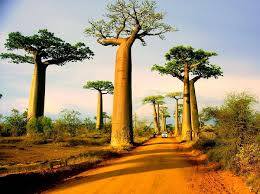
The Pope and the Baobab
Recent news reports confirm that the iconic baobab, the famous African tree that can live thousands of years, reach nearly 100 feet high and grow trunks that are 32 feet in diameter, is endangered.
“That’s too bad,” you might say, “but I have too many real problems to deal with. I can’t worry about a species of tree I’ve never seen or, to be honest, care much about.”
Understandable maybe. But add the baobab to coral, glaciers, polar bears, the Dead Sea, the Everglades, emperor penguins, the Bengal and Indochinese tigers, the black rhino, the Amur leopard, the Eastern and Western Lowland and Mountain gorillas, the orangutan and chimpanzee, the African wild dog, the Bluefin tuna, and many other natural wonders to the long list of the endangered and you may be more interested.
What’s It Good For?
But maybe you’re interested only in so far as endangered things and species “affect humans.” Well, let’s go back to the baobab. According to the periodical, Scientific American, “one baobab tree in South Africa is so large that a popular pub has been established inside its trunk. Many local cultures consider baobab trees to be sacred. Others use them for their nutritious fruits, edible leaves and beautiful flowers.”
But to bring the problem closer to home, a recent news article in USA Today says hundreds of thousands of homes along U.S. coasts are at risk of devastating coastal flooding over the next 30 years as climate change causes oceans to rise. The article quotes the science advocacy group, Union of Concerned Scientists, saying that about 311,000 homes, worth about $120 billion, are at risk.
And scientists say warming temperatures moving north will likely bring viruses like Zika and other diseases now only found in tropical or semi-tropical climates.
Our Common Home in Danger
Despite what some science deniers may say, our common home is in danger, and most people don’t give it a second thought. Respondents were asked in a 2016 Gallup poll to mention their top issues. In a list in which at least 4 percent of respondents gave their priority issues, the environment, including climate change and global warming, were unmentioned.
One world leader who has given it a lot of thought is Pope Francis, who continues to return to the subject in speeches and writing. In a recent meeting with top executives of the world’s main petrol, natural gas and energy-linked investment companies, he linked environmental issues with poverty and problems of migration and violence.
“The energy question has become one of the principle challenges facing the international community,” he told participants. “The way we meet this challenge will determine our overall quality of life and the real possibility either of resolving conflicts in different areas of our world or on account of grave environmental imbalances and lack of access to energy, providing (people) with new fuel to destroy social stability and human lives.”
He reminded the executives that “it is the poor who suffer most from the ravages of global warming, with increasing disruption in the agricultural sector, water insecurity, and exposure to severe weather events. …Many of those who can least afford it are already being forced to leave their homes and migrate to other places that may or may not prove welcoming. Many more will need to do so in the future.”
Fundamentally Religious
Some would say that the Pope, as a religious leader, should stick to “religious” subjects. But he sees preservation of the earth as fundamentally religious, and people searching for God should be advocates for measures that preserve the environment.
In his 2015 encyclical Laudato Si, the Pope wrote that St. Francis of Assisi “… reminds us that our common home is like a sister with whom we share our life and a beautiful mother who opens her arms to embrace us.
“This sister now cries out to us because of the harm we have inflicted on her by our irresponsible use and abuse of the goods with which God has endowed her,” the Pope writes. “We have come to see ourselves as her lords and masters, entitled to plunder her at will. The violence present in our hearts, wounded by sin, is also reflected in the symptoms of sickness evident in the soil, in the water, in the air and in all forms of life.”


